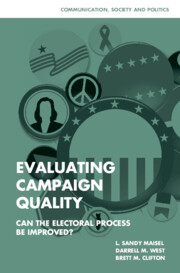3 - Impact on Campaign Conduct
Published online by Cambridge University Press: 03 December 2009
Summary
Critics have leveled a variety of complaints at professional campaigners, from suggesting they use shrill and nonsubstantive rhetoric and have financial conflicts of interest to arguing that they rely on unfair, misleading, or deceptive electoral strategies. With the centrality of their function in democratic elections, it is crucial to understand the role consultants play during the electoral cycle and whether the presence of particular reforms is associated with improvements in the campaign.
Using data from our consultant survey, we argue that the relationship between particular reforms and various indicators of campaign conduct is not strong. Organizing debates or issue forums, having candidates who attend professional training schools, or getting campaigners to sign conduct codes is associated with some positive features of campaign conduct, but the relationship is not very consistent. No single reform is consistently linked to various measures of improved campaign conduct.
The reason for this lack of strong relationship is that most reform proposals do not fully appreciate the incentives facing many professional campaigners. Rather than addressing the political and financial incentives that motivate these individuals, efforts to change campaign conduct play to a sense of civic responsibility or collective well-being for society as a whole. As a consequence of not understanding the incentives consultants have for campaign conduct, these reform proposals do not achieve their desired impact. These ideas simply are out of sync with the factors that govern the thinking and behavior of campaign elites.
- Type
- Chapter
- Information
- Evaluating Campaign QualityCan the Electoral Process be Improved?, pp. 32 - 45Publisher: Cambridge University PressPrint publication year: 2007



